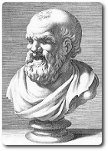The White Devil Contents
- Social / political context of The White Devil
- Religious / philosophical context of The White Devil
- The Theatre
Act 1 scene 1
Synopsis
In Rome, Lodovico is talking with his friends, Antonelli and Gasparo just before he is banished from the city. He complains about his misfortunes and blames it on the rich and powerful. His friends remind him that he has in fact squandered his own fortune and ruined others, as well as committing murder. However, Lodovico dismisses the latter as unimportant since he has not been executed for it, just banished.
Lodovico compares himself with the Duke of Brachiano, who is seeking an affair with Vittoria Corombona. He claims that Vittoria could have used her charms more effectively on Francisco de Medici, Duke of Florence, to get Lodovico a pardon. Antonelli tells Lodovico that his friends will work to repeal his banishment, although Lodovico threatens revenge (if he returns) on the ‘Great men' who caused his downfall.
Commentary
It is typical of plays of this period to have the issues of the play introduced in the first scene by relatively minor characters before we meet the main players.
 Democritus: A reference to view of the Roman philosopher, Democritus, that there were two gods; one for reward, one for punishment. This knowledge of classical learning had become available in the Renaissance.
Democritus: A reference to view of the Roman philosopher, Democritus, that there were two gods; one for reward, one for punishment. This knowledge of classical learning had become available in the Renaissance.
God 'quite them: Lodovico is calling on God to pay back (requite) his enemies. This is an early reference to the theme of vengeance.
Fortune: The introduction of the theme of fortune shows the uncertainties of the world where one can suffer sudden reversals. Lodovico is revealed as a malcontent (see Theatre context > The malcontent), someone who feels they have been dealt a bad hand in life. Fortune is compared to a whore. This links to the theme of woman's inconstancy which runs through the play.
Great enemies: Like many people in the play, Lodovico blames the rich and powerful and the court for his misfortunes.
Mummia: Medicine made from dead flesh.
Pandarism / pander: An attempt to procure sexual favours. A pander was a go-between who set up assignations.
The honour of Vittoria: Lodovico is angry at Brachiano and Vittoria for their sexual indiscretions and yet he would like Vittoria to compromise her honour on his behalf. This is typical of the attitudes concerning the honour of women, indicating a degree of hypocrisy.
Have a full man: Bear up under adversity. Refers to the necessity of the aristocracy maintaining their sense of honour.
Painted comforts: False, artificial. The theme of false appearances runs throughout the play.
Great men … fleeces: The scene ends with a rhyming couplet, which effectively illustrates Lodovico's cynicism, highlights the issue of ‘Great men' and signals an exit for the actors.
Investigating Act 1 scene 1
- What initial impressions of Italian nobility are the audience given from this scene?
- What appears to motivate Lodovico?
- What function do Antonelli and Gasparo have in this scene?
- Make a list of the imagery used by Gasparo and Lodovico
- How does it help to reveal the latter's character and motivation?